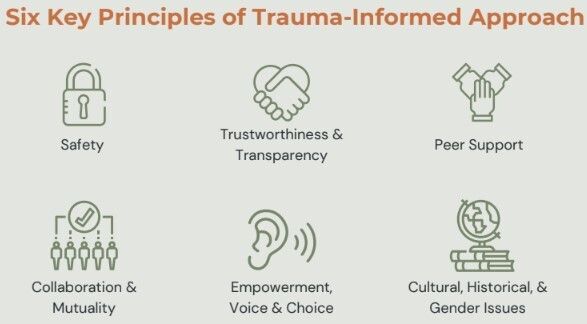
AAU has been invited by Trauma-Informed Utah to be part of an extensive program to evaluate and improve our agency-wide overall trauma-informed systems, processes, and approach. A core team has been established, and we have begun the 6-month journey.
Why?
Despite high rates of trauma in refugees, refugee youth, and human trafficking victims, many demonstrate real resilience. Research indicates that supportive community resources, including trauma-informed care, significantly enhance their ability to cope and recover from traumatic experiences.
What is a trauma-informed approach?
A program, organization, or system that is trauma-informed realizes the widespread impact of trauma and understands potential paths for recovery; recognizes the signs and symptoms of trauma in clients, families, staff, and others involved with the system; and responds by fully integrating knowledge about trauma into policies, procedures, and practices, and seeks to actively resist re-traumatization.
A few fast facts:
- People with refugee backgrounds are at a higher risk for mental health issues, with studies indicating that around 30% of refugees suffer from post-traumatic stress disorder (PTSD), and up to 40% experience depression.
- Approximately 80% of human trafficking victims experience severe psychological distress and trauma, often leading to conditions like PTSD, depression, and anxiety.
- A report by the U.S. Department of Justice found that 70% of victims had experienced physical violence and 40% sexual violence during their exploitation, leading to long-term trauma effects.
What are some Outcomes from implementing Trauma-Informed approaches?
- A study on trauma-informed care in refugee populations found that organizations implementing these practices reported a 40% reduction in PTSD symptoms among clients over a 6-month period.
- Refugee-serving organizations that adopted trauma-informed practices experienced a 25% increase in client engagement in services. Clients felt safer and more understood, leading to higher participation rates.
- Organizations using trauma-informed approaches reported that 75% of clients developed improved coping strategies and resilience. This was evidenced by client feedback indicating they felt more equipped to manage stress and trauma-related symptoms.
- People with refugee backgrounds accessing trauma-informed services showed improved economic outcomes, with studies indicating that 60% of clients reported securing stable employment or educational opportunities after receiving trauma-informed support.
- Programs that integrated trauma-informed care within refugee communities reported an increase in community resilience, with 80% of participants indicating a stronger sense of community and support among peers, leading to better integration outcomes.
- Organizations that adopted a holistic, trauma-informed approach noted a 30% improvement in overall well-being scores among clients, encompassing mental, emotional, and social health metrics.
